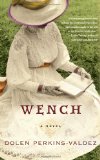 Wench is an artfully told story. We are introduced to a group of slaves who have accompanied their masters to a resort in Ohio in the summer of 1852. Just as we get to know these characters and a bit about their masters, the next section flashes back to 1842 – 1849. Lizzie is definitely the protagonist of this novel, and this flashback addresses the most curious of the relationships — that between Lizzie and Master Drayle. Does she really love him? Does he really love her? The entire novel has this unexpressed theme in the background: What does the institution of slavery do to the slaves (which actually got me thinking to what the implications still are 150 years later) — their feelings about white people and themselves, their motivation, their entrapment?
Wench is an artfully told story. We are introduced to a group of slaves who have accompanied their masters to a resort in Ohio in the summer of 1852. Just as we get to know these characters and a bit about their masters, the next section flashes back to 1842 – 1849. Lizzie is definitely the protagonist of this novel, and this flashback addresses the most curious of the relationships — that between Lizzie and Master Drayle. Does she really love him? Does he really love her? The entire novel has this unexpressed theme in the background: What does the institution of slavery do to the slaves (which actually got me thinking to what the implications still are 150 years later) — their feelings about white people and themselves, their motivation, their entrapment?
The next two sections take place in the “present” summers of 1853 and 1854 as the slaves return to the resort, catching each other up in their lives, and enjoying the comraderie of the slaves from other plantations. While this environment offers them a break from their regular workaday lives, it also ends up intensifying the differences between them and their white masters and even the freed African Americans who live in Ohio.
When I first started Wench, it was like trying to read a book in a foreign language.
Yes, there was slave dialect used, but that isn’t what I’m talking about (the dialect did not make it difficult to read as some books set in that era do).
What I mean is that while I read each scene I had to work to actively process what I was reading — to frame it so that I could understand it.
This book has been compared to the Pulitzer Price winning The Known World (linked to my review). Yes, it’s similar, in that fact and fiction meld seamlessly and convincingly, but I found Wench to be a much better story — more original, more compelling, and with more likable characters.
Yes, it’s a tough subject, but author Dolen Perkins-Valdez tells a compelling and enjoyable story without sugar-coating the reality of this horrible part of our history.
Content note: There is fairly explicit talk about sex, since it was a very real part of the master/slave relationships, as well as some violence (beatings). All of this is intrinsic to the story, but I know it’s content that some people avoid (and might not expect in this kind of book).
I am pleased to be able to offer a copy to one of you (U.S. and Canadian shipping addresses). Leave a comment if you’d like to win. We’ll announce the winner on February 24.
THIS GIVEAWAY IS CLOSED.
Jennifer is enjoying her focus on African American works and authors this February. Follow her blog Snapshot to find out about what else she enjoys.
Check out our current giveaways (we have a LOT this month). Subscribe to our feed. Follow us @5M4B on Twitter.
I’m currently reading Chesapeake by James Michener, and they talking about slaves in the part that I’m reading at the moment.
I would love to win this book!!
This book is amazing! I read it in a day. The relationshps, life struggles, and the historical background during this time period are captured in a beautifully written fictional depiction of Lizzie as she struggles to decide what is best for herself and most importantly, her children. FABULOUS!
Thanks for weighing in Heidi.
I thought it was quite unique — the setting, the situations, the characters. Really original.